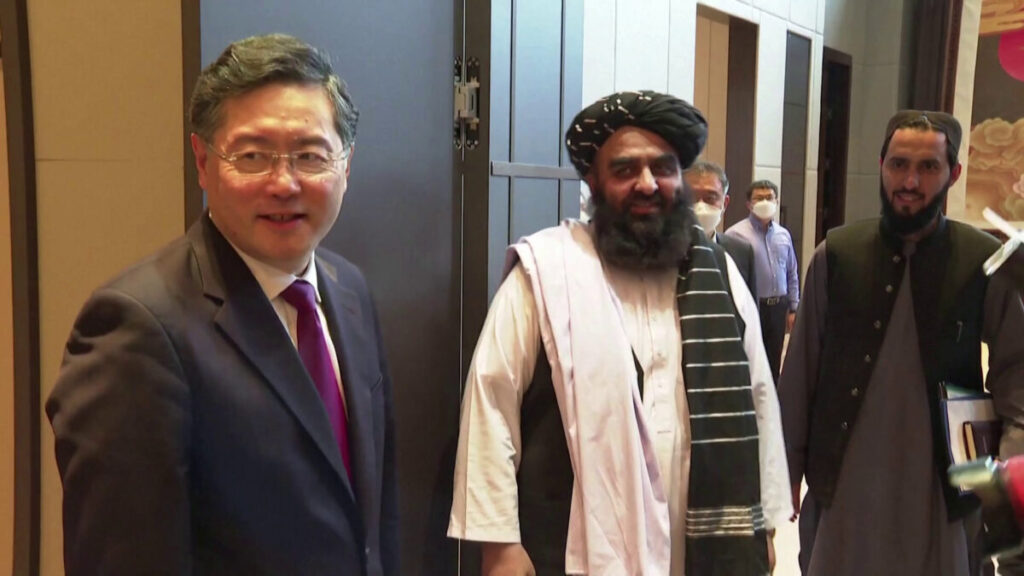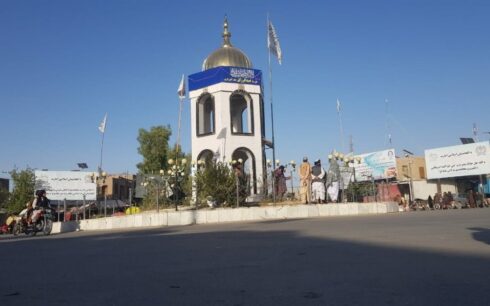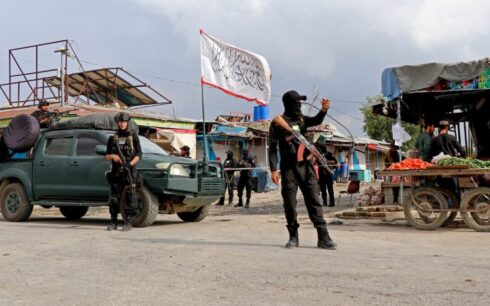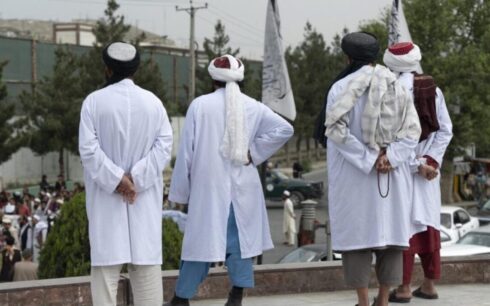Diplomats from Russia, China, Iran, Uzbekistan, Turkmenistan, Tajikistan and Pakistan attended the fourth meeting of Afghanistan’s neighbors, known as Samarkand meeting on Afghanistan, this week to discuss the situation on the ground.
Taliban’s foreign minister Amir Khan Muttaqi was invited to attend at the 11th hour despite a travel ban on him as part of UN sanctions. He accepted the invitation and traveled to Uzbekistan to attend the meeting.
The former ambassador of Afghanistan to Canada, Shinkai Karokhail said Russia might have helped facilitate this as it is currently chairing the UN Security Council.
He said: “Russia might have helped in [clearing] Muttaqi’s travel to Samarkand because it is chairing the Security Council and their reasoning might be that the presence of a Taliban representative is important given the concerns neighboring countries have about Afghanistan.”
Muttaqi and 12 other Taliban leaders are among 135 Taliban officials who were added to the UN sanctions list based on a UNSC resolution in 2011. UN sanctions on these Taliban authorities included freezing of their assets and a ban on travel.
But in 2019 when the US-Taliban negotiations intensified, travel bans were lifted against 13 Taliban leaders so that they could attend negotiations in Doha.
Taliban’s deputy prime minister Abdul Ghani Baradar, Taliban foreign minister Amir Khan Muttaqi, Taliban deputy foreign minister Abbas Stanekzai, Taliban information and culture minister Khairullah Khairkhwah and Taliban intelligence chief Abdulhaq Wasiq are among these 13 individuals.
“Countries in the region and the world want to meet them (Taliban) and share their concerns directly with them. Meanwhile, they are not invited as official participants of such meetings but they are invited as a monitor,” said Mohammad Shafique Hamdam, a political affairs analyst.
Exemption of the travel ban on Taliban leaders ended in August 2022 after an extension. The decision whether to extend the waiver divided UNSC members and they could not reach an agreement on it.
Previously, Latif Mansour, Taliban’s minister of energy and water, traveled to Uzbekistan while being under the travel ban. There have also been reports about Taliban intelligence chief Abdulhaq Wasiq’s trip to Qadar.
“All countries that are members of UNSC are responsible to implement decisions of the UN Security Council,” Jannat Karim, a political affairs analyst said.
Muttaqi’s speech in Samarkand
In his speech on the sidelines of the Samarkand meeting, Muttaqi hinted at issues he called recent improvements in Afghanistan.
He called the withdrawal of foreign forces from Afghanistan and Taliban return to power a positive step that, he said, led to the formation of a “powerful central government.”
He mentioned rule of law and order, reliable security, end to corruption, access to judiciaries and ban on poppy cultivation and drug trafficking as recent developments under Taliban rule in Afghanistan.

But analysts questioned Muttaqi’s statements and said “most of his remarks are not based on realities on the ground” in Afghanistan.
Analysts said that an increase in poverty, suppression of people’s rights and freedoms and brain drain have been negative impacts of Taliban’s rule on Afghanistan.
“This regime is not definable in any structure. It is not ensuring women’s rights, it is not ensuring citizens’ rights, there are tortures,” said Ainuddin Bahaduri, a legal affairs analyst.
“The claims made by the Taliban previously and now are not based on realities on the ground; they are only justifications that Taliban is putting forward and is trying to show to the world that they have addressed these issues,” said Jawed Jawed, analyst in political affairs.
Samarkand meeting participants seek inclusive government in Afghanistan
The fourth Meeting of Foreign Ministers of Afghanistan’s Neighboring States was held on April 13 in Samarkand, Uzbekistan where foreign ministers and senior officials of China, Iran, Pakistan, Russia, Tajikistan, Turkmenistan and Uzbekistan attended.
The participants of the meeting in a joint declaration published by China’s Foreign Ministry said that in a frank and pragmatic atmosphere of mutual understanding, the parties held a comprehensive, deep and constructive discussion of the current situation in Afghanistan, the prospects for its development.
The parties reaffirmed their commitment to the development of Afghanistan as a peaceful, united, sovereign and independent state, free from the threats of terrorism and drug trafficking.
They noted the importance of building an inclusive and broad-based governance system in Afghanistan that reflects the interests of all segments of Afghan society.
The parties noted that the terrorism-related security situation in Afghanistan was still severe and reaffirmed their commitment to enhance cooperation on counter-terrorism and security among neighboring countries and to develop a united front against terrorism, the declaration said.
They pointed out that all terrorist groups, namely the Islamic State of Iraq and the Levant (ISIL), Al-Qaeda, the Eastern Turkistan Islamic Movement (ETIM), the Tehreek-e-Taliban Pakistan (TTP), the Balochistan Liberation Army (BLA), Jundallah, Jaish al-Adl, Jamaat Ansarullah, the Islamic Movement of Uzbekistan (IMU), and other terrorist organizations based in Afghanistan continue to pose a serious threat to regional and global security.
The participants of the meeting stressed the importance of combating the drug threat and called for support for the development of drug crop substitution programs, as well as for combating drug production and trafficking.
They emphasized the need for the international community to maintain dialogue and communication with Afghanistan and called for further measures to improve the living conditions of the people and expressed confidence that “the Afghan authorities” will respect fundamental human rights, including the rights of all ethnic groups, women and children, and will provide every citizen of Afghanistan with equal rights to participate in the socio-political, economic and cultural life of the country.The parties noted the relevance of coordinating regional and international efforts to ensure security and stability in the region, emphasizing the positive contribution of existing regional forums, including the Tashkent International Conference “Afghanistan: Security and Economic Development” and the Moscow Format Consultations on Afghanistan.





